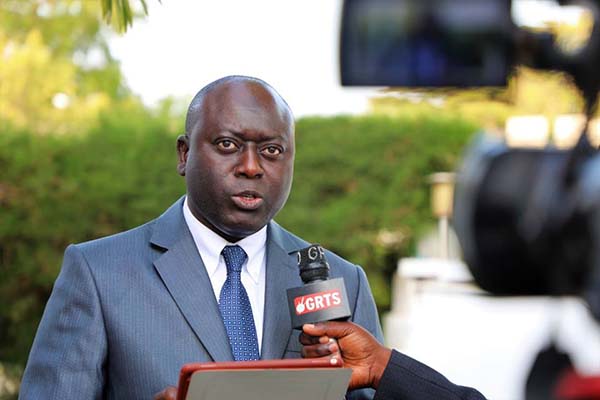The President of the Republic of The Gambia His Excellency Adama Barrow has assented to the much anticipated Access to Information Act, thereby fulfilling one of his political campaign promises much to the delight and praises of Gambians and development partners. The National Assembly passed the ATI Bill on 1st July 2021 and the President assented to it last week.
Reacting to this monumental development, the Minister of Information and Communication Infrastructure Ebrima Sillah said the ATI Law will help facilitate the work of journalists, as well as enable citizens at large to access government information thereby enhance accountability and transparency. He added that this is a welcome gesture and a show of political will on the side of the President and the Government of The Gambia. “It also shows the commitment of the government to widening of the democratic space and ensure that citizens of The Gambia and those that are leaving in this country are fully informed of activities happening in the county”.
Minister Sillah went on to explain that the preparation of the Bill was a very consultative process, saying it started with The Gambia Press Union (GPU) consulting with the Ministry of Information and Communication Infrastructure, the Ministry of Justice, and later the CSO Coalition led by TANGO and other relevant groups. “A draft was prepared and presented to MOICI and the Attorney General; a committee was established to look through the document, see what other countries are actually doing with ATI Act, their challenges and failures and with lessons from those countries, they came up with a document that they believe is best suited for this country.”
He said having the ATI Law means The Gambia’s democracy is now maturing at a very impressive speed. He added: “We now join the league of nations that have this forward-looking and progressive law that can transmit democratic governance and also more importantly having a government that is in charge; but also ensuring that the democratic space is widening”.
The Minister explained that the implementation of this law by government will be in two different components: one is the proactive disclosure of public information where a commission is envisaged to be set up. “This commission will have its own secretariat and reports will be submitted to the commission and compiled for public consumption”.
He went on: “There is also this process where people can voluntarily go and ask for public information that is available”.
However, Mr Sillah cautioned that when we say public information we also have to be mindful that there are certain information that are classified “and by this Act you cannot disclose it in any way or divulge the content of any document or information that is regarded as classified”.
He assured of his office’s commitment to work with the Secretary General and Head of the Civil Service to ensure that all permanent secretaries in this country are well prepared so that documents in their possession that are seen as sensitive are documented as classified and they cannot under any circumstance be revealed.
“There are specific information relating to national security, operations by the security services , the privacy of third parties and minors. These information under any circumstances cannot be released; only government can do so”.
On anticipated challenges, the Information Minister affirmed that the ATI Act does not mean that people can access or ask for any information and the challenge may be identifying those information.
He noted that information officers will play a very important role in this as they will serve as liaison between the public and the various ministries and that request will be passed through them.
He indicated that the ATI comes with many great opportunities; that all democratic countries are ranked based on some of these indicators measuring the commitment of governments regarding enhancing and abiding by standards of democratic governance.
He indicated that these are standards that partners, donors and foreign direct investors would want to know if they exist; that a country is stable and democratic, the laws are functioning, respect for human rights and rule of law is guaranteed.
Minister Sillah urged everyone to be cooperative, while assuring effective implementation of the Act.

